(Cervena Barva Press, 2015)
Review by Lawrence Kessenich
To be an exile is to both be estranged from one’s homeland,
more deeply attached to it, and also able to see both one’s homeland and one’s
adopted country with an objectivity unavailable to lifelong inhabitants. All of
this comes into play in Claudia Serea’s poetry collection, To Part Is to Die a Little.
Serea emigrated from Romania to the U.S. in 1995, evidently
to New York City or nearby, because that city appears often in this collection,
acutely observed and with attention to the concrete details of places and
people:
From “Soap opera”:
December again on 38th Street,
where statues push their heads through the walls
over a DVD store, a barber shop, a deli,
to better see what’s happening…
From “Paper cup city”:
The dark coffee
Of the mornings
in a paper cup
city
in a paper cup
city
People stand in line;
their loneliness
is the loneliness
of plastic straws
on the shelf…
their loneliness
is the loneliness
of plastic straws
on the shelf…
Daybreak is
a plastic
teaspoon in the sky,
over
paper plates
and brown napkins…
a plastic
teaspoon in the sky,
over
paper plates
and brown napkins…
From “Mr. Hoffman”:
Mr. Hoffman has a bright green hat
and red jacket, has glasses,
sits on a small chair
play waltzes on the accordion
in the 57th Street station.
and red jacket, has glasses,
sits on a small chair
play waltzes on the accordion
in the 57th Street station.
A little town with steep streets
and old buildings with geraniums,
scenes from old European movies,
pour from his waltz…
and old buildings with geraniums,
scenes from old European movies,
pour from his waltz…
Through the eyes of this immigrant, one sees one’s own
country through fresh eyes, always an enlightening experience—and sometimes
painful, as when she points out the ignorance of Americans about her homeland
in “Breakfast at Cucina”:
Are you a gymnast?
the woman asks
when she finds out
my accent is Romanian.
the woman asks
when she finds out
my accent is Romanian.
Sure, I’d like to say.
In my country,
the little girls balance on beams
as soon as they come out
of their mothers’ wombs.
the little girls balance on beams
as soon as they come out
of their mothers’ wombs.
More poignant, however—and my favorite section of the book,
Letters to Romania—are the poems where Serea looks back longingly at the land
where she was born, grew up, and where her family and friends of many years
still reside. What often sticks in her mind, of course, are concrete images
that make the places and people come alive for the reader.
In “Es-tu-là” she
imagines her mother singing in the kitchen:
My mother sings to the chopped
onions.
She sings to the parsley and pots.
She sings to the stirred stew.
That’s why America is rich,
because it’s where you live,
you, my only true treasure.
She sings to the parsley and pots.
She sings to the stirred stew.
That’s why America is rich,
because it’s where you live,
you, my only true treasure.
The kitchen is filled with sun.
The windows are filled with wind.
No letters came today…
The windows are filled with wind.
No letters came today…
In “On Easter morning” she remembers:
After church, we won’t enter the
house
until my father digs a shovelful of grass
and places it on the threshold, roots and all.
Step on it, for a new beginning, he says…
until my father digs a shovelful of grass
and places it on the threshold, roots and all.
Step on it, for a new beginning, he says…
In “Ovidiu” she recalls a Romanian town she visited:
A bright yellow Muslim minaret and
a white church
hang upside down from the clouds…
hang upside down from the clouds…
From these low hills, the poet
looked on,
with exiled eyes,
into the eyes of the Black Sea…
with exiled eyes,
into the eyes of the Black Sea…
A school, a bread store, a closed
pub,
A skinny Pegasus pulls a carriage with corn…
A skinny Pegasus pulls a carriage with corn…
And in “The last way” she shows us a country funeral:
Dressed in black with headscarves,
like ravens, they come
to walk the dead man
on his last way.
like ravens, they come
to walk the dead man
on his last way.
Up on the tractor,
his coffin is decorated
with crying daughters
and orange lilies.
his coffin is decorated
with crying daughters
and orange lilies.
There is so much life in these people and places that the
reader can hardly help feeling the loss of it all along with Serea. There is so
much longing in this book that it tugs at the heartstrings, but that longing
also forces the reader to look at the riches in his own life, to contemplate
their loss, and thereby to appreciate them more.



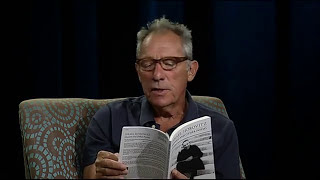





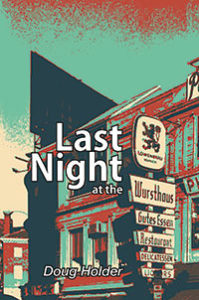



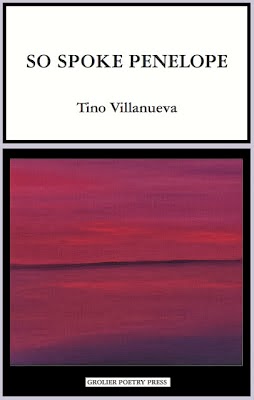
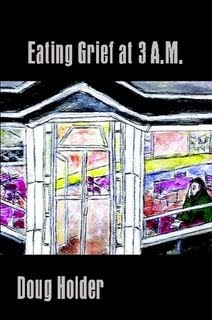

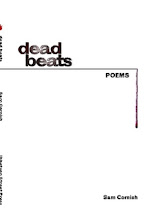







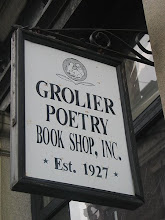


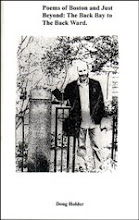
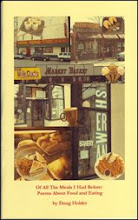




No comments:
Post a Comment